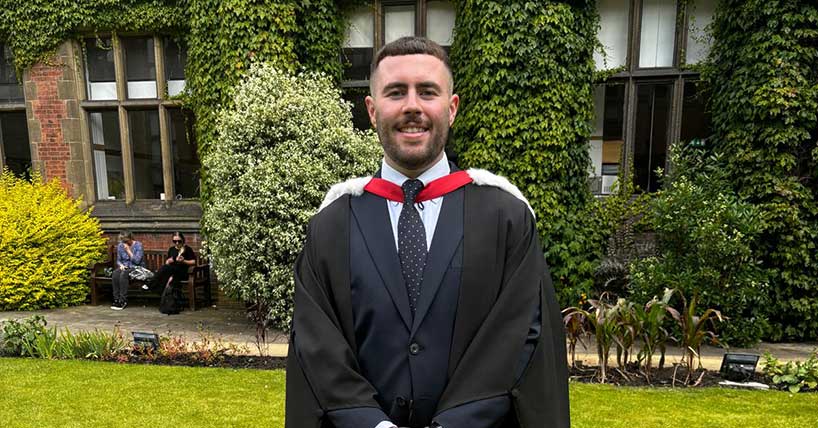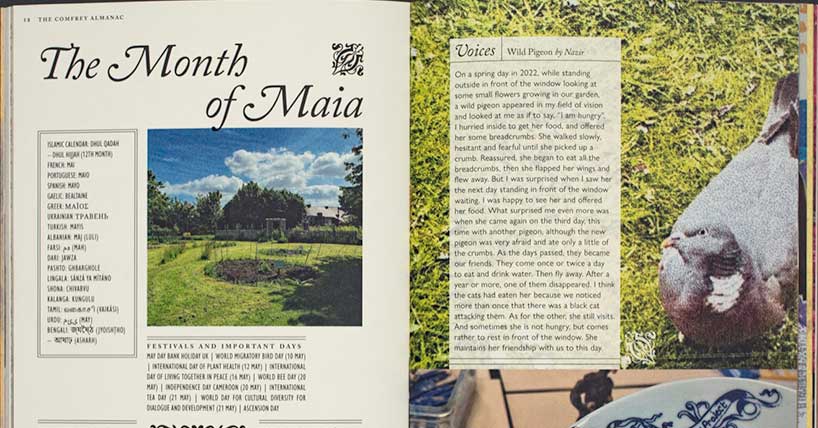ALL CRUK
Alumnus who survived teenage cancer welcomes multi-million funding
Published on: 26 September 2025
A Newcastle University graduate who survived cancer as a teen and was inspired to become a doctor by those who cared for him, is welcoming a multi-million pound investment from Cancer Research UK.
Acute lymphoblastic leukaemia
Dr Dan Mattison, now 25, was diagnosed with acute lymphoblastic leukaemia (ALL) when he was 14-years-old and had just started studying for his GCSEs at Cramlington Learning Village.
ALL is a cancer of the white blood cells, which help the body to fight infection. Each year in the UK around 400 children are diagnosed with ALL.*
Dan’s mum, Angela Mattison, 55, who works as an Assistant Project Manager at Newcastle University, said: “Dan had always been very sporty and a keen footballer, but at the start of Year 10 he couldn’t keep up in matches and he later collapsed with exhaustion after a run.”
His parents took him to the GP, who sent him for blood tests. Later that night they got a call telling them to take him to hospital immediately, as it looked like he might have leukaemia.
Remembering back to that night, Angela said: “At 2am the next morning the results were confirmed and he was diagnosed with acute lymphoblastic leukaemia. He began a course of intensive chemotherapy straight away which caused a number of side effects and made him very poorly.
“At one point he was hospitalised for 16 days over Christmas. It was an awful time and meant the family, including my husband Gary and our daughter Evie, who was just 9, were all apart, for the holiday. Although it was Dan who had the diagnosis, cancer had an impact on all of our family.
“After more than three years, Dan completed his treatment in January 2018, two weeks before his 18th birthday and we were able to look forward to the future.”
Because of his experience, Dan set his heart on becoming a doctor. After graduating from Newcastle University with a degree in medicine, he is now fulfilling his dream, and is a Foundation Year 2 (F2) doctor at a hospital in Warrington.
Dan, who now lives in Manchester, said: “It’s all a bit of a blur looking back now, I remember being shocked when I was diagnosed, but also remember feeling unwell for a while before then.
“My treatment was tough, but I was lucky to be under the care of a fantastic team, whose compassion and positive attitudes ultimately inspired me to become a doctor. They created such a kind, caring and cheerful environment, and all had such passion for their work, things I realised I wanted in whatever career I chose. I learned so much from them both from a personal and professional point of view, and I always aim to provide the same qualities to patients of my own.
“It’s been a while since I finished my treatment now, and I have begun to realise the long term impact of a serious illness at such a young age, especially psychologically. I also have a greater appreciation of how lucky I was, having known other young people who unfortunately did not survive.”
Angela, said: “No parent expects to hear those terrible words, ‘your child has cancer’. And his diagnosis turned our world upside down. But, he coped with years of treatment with unbelievable courage and strength.
“Thanks to improvements in research and better treatments, we’ve been able to see Dan complete school, graduate and go on to be a doctor, inspired by the amazing medical professionals who helped save his life 11 years ago. Not only that, but his sister Evie, now 20, has also been inspired by this and is studying Pharmacology at Newcastle University and wants to explore a career in cancer research.”
As part of Childhood Cancer Awareness Month this September, the family are encouraging people to support Cancer Research UK for Children & Young People to help drive more progress in tackling the disease.
Gary said: “There’s not a day goes by, even now, where we don’t think about what happened to Dan. It can be a feeling of worry if we hear he’s poorly or quite often it’s a feeling of how lucky we are that he was able to pull through when we met others on the ward who didn’t make it.
“We are incredibly grateful to the researchers and medical professionals who cared for Dan. Quite simply without their work our lives would look totally different today.”

Super-enhancers
Two research projects at Newcastle University are celebrating £4.1million of investment from Cancer Research UK to explore how children with ALL, the same cancer Dan had, can be diagnosed and treated more effectively to improve survival rates.
Dr Lisa Russell, Senior Lecturer in Childhood Cancer and Haematology, and Professor Anthony Moorman, Director of the Leukaemia Research Cytogenomics Group, will lead the two research projects that will explore the biology of ALL and how we can use that information to find the most effective treatments and reduce the challenging long-term side effects of chemotherapy.
Thanks to major advances in treatment, more than 9 in 10 children in the UK with ALL now survive for at least five years, compared with around 7 in 10 in the 1980s,** but there are still some children and young people for whom treatment doesn’t work and there are also long-term side effects associated with treatment which can affect them later in their life.
Dr Russell’s team has received £1.47 million from the charity to explore super-enhancers, which are powerful switches in DNA that determine how cells grow and behave.
In healthy cells, these switches help maintain normal cellular function, but in cancer cells, they can be disrupted to encourage growth of the disease.
The six-year research grant aims to understand how these super-enhancers work in children with B cell acute lymphoblastic leukaemia (B-ALL) and to develop targeted treatments that disrupt the changes that promote cancer growth while sparing healthy cells.
Dr Russell, who is based at the Wolfson Childhood Cancer Research Centre in Newcastle, said: “We’re looking at what drives the changes in the genetic code right from the start, before the domino effect of cancer takes hold.
“If we can understand how super-enhancers switch on the cancer-causing genes, we hope to identify new ways of targeting this process, a process that is unique to the cancer cells.”
“Our research has the potential to find new changes in the genetic code that enable the leukaemia cells to evade treatment. By helping doctors predict how a patient will respond to treatment, we can give the most effective treatment at the beginning, improving survival rates and reducing the toxicity of treatment and its harsh side effects on young children.”
Genetic biomarkers
Meanwhile, Professor Moorman and the Leukaemia Research Cytogenomics Group (LRCG) have been awarded a five-year programme grant for £2.7 million to expand their work on the genetic biomarkers of leukaemia, which are used to help predict how patients will respond to treatment.
The LRCG has been at the forefront of incorporating genetics in clinical trials for leukaemia since the early 1990s. Originally established at the Royal Free Hospital in London, the group is now based at Newcastle University.
LRCG collects and analyses genetic data from patients of all ages across the UK to understand how different types of leukaemia behave. Their research develops algorithms that help doctors choose the most effective treatment pathways for each patient.
Their work supports major clinical trials in the UK and Europe, and this latest funding will enable further data collection and research to improve survival rates and quality of life for patients. It will also support the creation of a new database that will make decades of research accessible to clinicians and families worldwide, helping to inform treatment decisions beyond clinical trials.
The majority of people who benefit from the work are children diagnosed with ALL, but adults and children with acute myeloid leukaemia (AML), another blood cancer, will also see the impact.
Professor Moorman said: “We’ve been able to build one of the most detailed leukaemia data resources in the world, previously funded by Blood Cancer UK, and our work, previously funded by Blood Cancer UK, feeds directly into clinical trials, helping doctors to match children with the most effective treatment pathways based on their genetic profile, giving them the best chance of recovery.
“For a child diagnosed with ALL at three-years-old, who is then treated successfully, we hope they’d have another 80 years of life ahead of them. So it is crucial we work to improve the quality of their life by reducing long-term side effects while still beating the cancer.“
The researchers are encouraging people to support Cancer Research UK for Children & Young People as part of Childhood Cancer Awareness Month, to help drive greater awareness of and more progress into cancer in young age groups.
Professor Moorman said: “This investment by Cancer Research UK simply wouldn’t be possible without the incredible efforts of fundraisers and supporters. Without funding like this we wouldn’t be able to make these advances and develop new biomarkers and algorithms for children and young people diagnosed with leukaemia.”
Dr Russell added: “The real experiences of supporters like Dan inspire us every day. Research can be repetitive. It’s hard and there can be lots of tears along the way, but the eureka moments outweigh it all. Our supporters and the families who benefit from our work motivate us to keep going and help more children diagnosed with this devastating disease.”
The investment has been welcomed by Dan and his family, who understand all too well the importance of advancing life-saving research and breakthroughs.
They are urging people across Newcastle to help by donating or picking up a gold ribbon badge – the symbol of childhood cancer awareness – available from Cancer Research UK shops this September.
Every year around 470 children and young people in the North East and Yorkshire are diagnosed with cancer.
Cancer Research UK has helped to more than double children’s cancer survival in the UK since the 1970s. Today, more than 8 in 10 children and young people diagnosed with cancer survive for at least 10 years, but there’s still much further to go.
Press release adapted with thanks to Cancer Research UK



